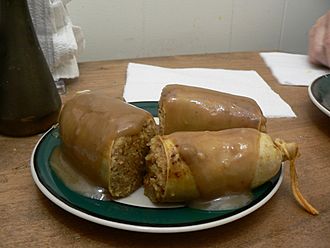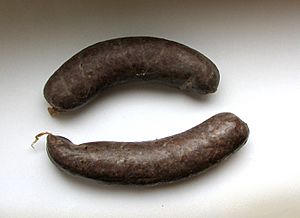Kishka (food) facts for kids
Kishka or kishke is a type of sausage or stuffed food. It's made by filling an animal intestine (or a fake casing) with a mix of meat and grains. This dish is popular in Eastern Europe and among people from those areas who have moved to other countries.
Ashkenazi Jews also eat a version of kishka. Their recipe follows special food rules called kashrut. The name kishke comes from Slavic languages and means "gut" or "intestine."
What is Kishka?
One type of kishka from Eastern Europe is called kaszanka. It is a type of blood sausage made with pig's blood and grains like buckwheat or barley. It uses pig intestines as its outer layer, or "casing." Like black pudding, it is often eaten for breakfast.
Kishkas can also be made with organ meats, such as liver, and different grain fillings. The color of cooked kishke can be grey-white or brownish-orange. This depends on how much paprika and other ingredients are used. In the Greater Białystok Area, kishka is often made with ground potatoes and pig intestines. There are also vegetarian recipes for kishka.
These sausages are popular in the Midwestern United States because many Polish people moved there. You can find different types of kishkas from special companies and delis. Some kishkas use blood as an ingredient, so some people might need time to get used to the taste. Kosher kishka recipes do not use animal blood or pork products.
Jewish Kishka Dishes
Jewish kishke is also known as stuffed derma. It is traditionally made from flour or matzo meal, a type of chicken fat called schmaltz, and spices. Today, fake casings are often used instead of beef intestine. Kishke is a common addition to Ashkenazi-style cholent, which is a slow-cooked stew.
You can buy prepared kishke in some kosher butcher shops and delicatessens. In Israel, it is found in the frozen-food section of most supermarkets. Some newer types of kishke include fillings like rice or diced chicken livers and ground gizzards. There are also vegetarian kishke recipes.
The stuffed kishke is usually placed on top of the cholent and cooked slowly overnight in the same pot. It can also be cooked separately in salted water with vegetable oil. Another way to cook it is to bake it in a dish and serve it with a gravy made from the cooking liquids.
The Song "Who Stole the Kishka?"
"Who Stole the Kishka?" is a famous polka song. It was written in the 1950s by Walter Dana, with lyrics by Walter Solek. Many bands have recorded and played this song. A very popular version was recorded in 1963 by the Grammy award-winning polka artist Frankie Yankovic.
Depending on who performs the song, it might also mention other Polish foods. These can include szynka (ham), chruściki/faworki (a type of pastry), pierogi (dumplings), sernik/serniczek (cheesecake), and kielbasa (sausage).
See also
 In Spanish: Kishka para niños
In Spanish: Kishka para niños
 | Aaron Henry |
 | T. R. M. Howard |
 | Jesse Jackson |



